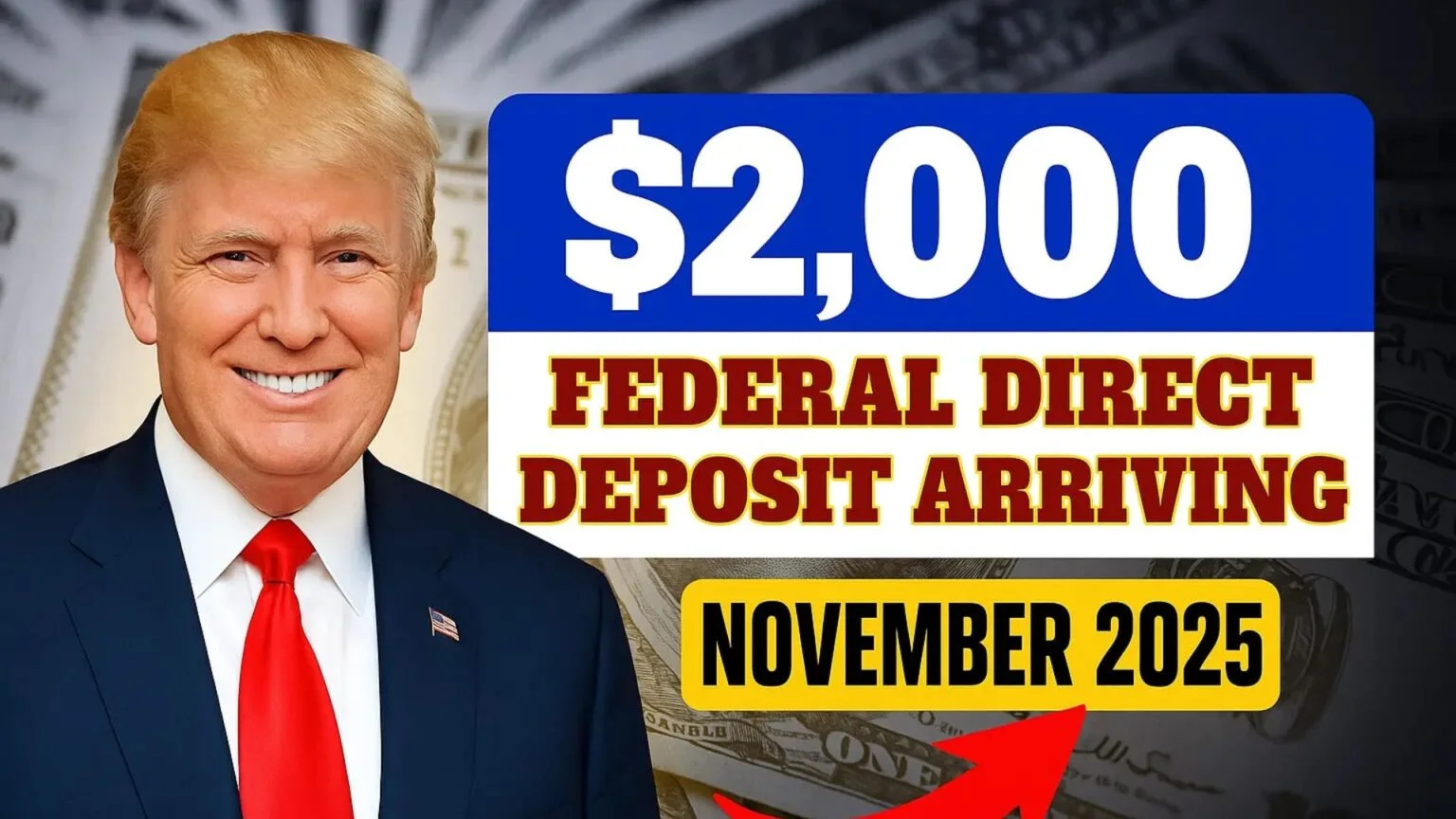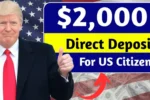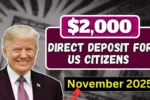$2,000 Federal Direct Deposit:As November 2025 approaches, many Americans are hoping for economic relief as the economy tries to adjust to rising living expenses. Word of the $2,000 federal direct deposit payment is spreading rapidly across the country, especially among senior citizens, low-income families, and low-income workers this year. While not all federal programs guarantee the full $2,000 payment, several government benefits, tax credits, and adjustments could result in eligible citizens receiving deposits up to this amount in November.This guide explains who may be eligible, when payments are expected, and what steps the IRS recommends to avoid missing out.
Why is a $2,000 federal payment being discussed?
The idea for a $2,000 payment stems from a combination of the following:
In recent months, Americans have increasingly come across headlines and social-media posts claiming that a $2,000 federal payment may soon be issued. This has led to confusion and questions about whether another large relief check is actually coming, who might receive it, and why the government is even considering such an amount.
While no official announcement has been made yet, the conversation around a potential $2,000 payment comes from economic conditions, political proposals, and ongoing inflation pressures affecting millions of households. Below is the full explanation.
Why Is a $2,000 Federal Payment Being Discussed?
The idea for a $2,000 federal payment stems from a combination of the following:
1. Rising Inflation and High Living Costs
Prices for groceries, housing, utilities, and transportation remain significantly higher than pre-2020 levels.
Many households, especially seniors and low-income families, are struggling to keep up with essentials.
2. Pressure on Congress to Provide Financial Relief
Several lawmakers have pushed for new financial relief as part of anti-inflation strategies.
Proposals include:
-
One-time payments
-
Tax rebates
-
Expanded credits for parents and workers
These proposals often mention amounts close to $1,200–$2,000.
3. Economic Slowdown Concerns
Slower job growth, rising debt levels, and declining savings have sparked concern that the U.S. economy could weaken in 2025.
Direct payments are one method historically used to stabilize the economy.
4. Seniors on Fixed Incomes Are Struggling
Social Security beneficiaries have been hit hard by rising prices, even after COLA increases.
Advocacy groups have been strongly pushing for:
-
A one-time $2,000 relief bonus
-
Additional boosts to retirement and disability benefits
This pressure has helped fuel the discussion.
5. Disability and Veteran Communities Need Support
SSDI, SSI, and VA disability recipients are among the groups most affected by inflation.
Lawmakers have suggested supplemental payments or bonus adjustments — often referenced in the $1,500–$2,000 range.
6. State Programs Are Influencing Federal Expectations
Several states have independently approved:
-
Inflation rebates
-
Tax refunds
-
Energy credits
-
Emergency housing payments
Some of these have totaled around $1,500–$2,000, leading people to believe a similar federal payment may follow.
7. Election-Year Discussions
With 2025 being a politically important year, financial relief proposals naturally receive more attention.
A $2,000 payment is widely viewed as a popular, voter-friendly policy, which has intensified public speculation.
Is a $2,000 Payment Guaranteed?
No.
As of now, the federal government has not officially confirmed a new round of $2,000 payments.
However, the fact that multiple congressional proposals and senior-support bills reference similar amounts is the main reason the rumor continues to circulate.
Who Would Likely Receive the Payment If Approved?
If the government approves a new $2,000 payment, eligibility would likely include:
-
Social Security retirees
-
SSI and SSDI recipients
-
Low-income workers
-
Veterans receiving VA benefits
-
Families meeting income limits
-
Taxpayers who filed returns recently
Like previous relief efforts, it would be a targeted benefit, not universal.
Frequently Asked Questions (FAQs)
1. Is the $2,000 federal payment real?
Not yet. It is being discussed through proposals and economic analysis, but no official program has been announced.
2. Why is $2,000 the number being mentioned?
Because several proposals for seniors, veterans, and low-income families have suggested one-time relief amounts around $1,800–$2,000.
3. Will everyone in the U.S. get this money?
No. If approved, it would most likely target:
-
Seniors
-
Disabled individuals
-
Veterans
-
Low-income taxpayers
4. When could the payment happen?
Discussions suggest late 2025, but timing depends entirely on congressional approval.
5. Will I need to apply?
Probably not.
Most eligible groups — such as Social Security or veteran beneficiaries — usually receive payments automatically.
6. Does this count as a stimulus check?
It is similar, but not identical.
This would be more of a relief payment or cost-of-living support, not a broad stimulus for all Americans.
7. Are states also giving out payments?
Yes. Several states have recently issued or approved rebates or tax refunds, which contributes to public expectations of a federal payment.
8. What should I do to stay updated?
Follow:
-
IRS announcements
-
SSA updates
-
Official government releases
Avoid relying on rumors or unofficial social media posts.





